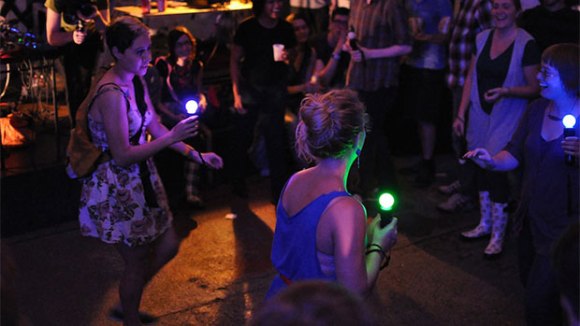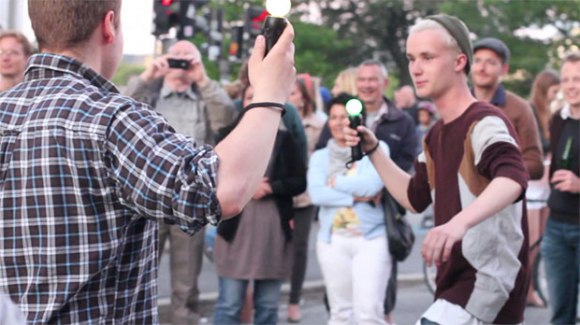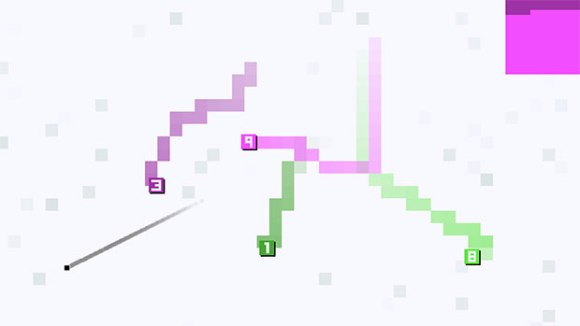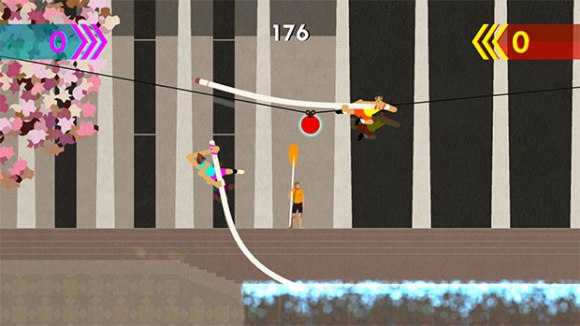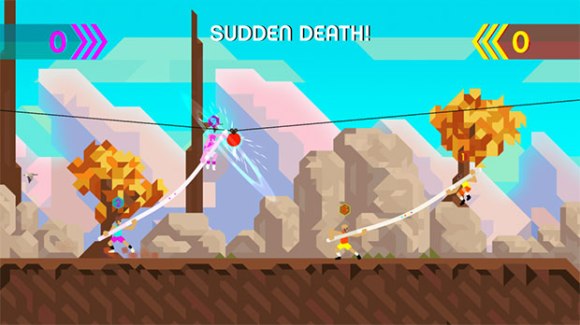Sportsfriends is built on the simple premise that you don’t need to play video games to have a good time with them. And in that regard, it succeeds. It is an absolute blast to play regardless of innate or earned skill level with a controller because it reduces everything down to its basest form. From input to strategy, it allows depth without complication. Just be sure to have some friends on hand to help.
Sportsfriends is actually a compilation of four different local multiplayer games with the gestalt release funded through Kickstarter from back in December of 2012. Rounded up by Danish indie collective Die Gute Fabrik, it includes their own Johann Sebastian Joust, Noah Sasso’s BaraBariBall, Bennet Foddy’s Super Pole Riders, and Ramiro Corbetta’s Hokra. Tied by a single thematic thread, they all focus on the idea of face-to-face competition. The most obvious (and the headliner) takes the face-to-face part quite seriously.
Johann Sebastian Joust
What is there left to say about Johann Sebastian Joust? You’ve been hearing about it since forever and probably even played it at a PAX or E3. It’s well known for one as being a video game with absolutely zero visuals given or needed through any electronics. It’s also well known for being one hell of a good time.
Between two and seven players hold either DualShock 3, DualShock 4, or PlayStation Move controllers and attempt to, for the most part, not move. Or at least that’s how you stay in the game. To win, you’ll have to knock other players out, which requires you to push, pull, trick, intimidate, and psychologically abuse everyone else. You see, the controllers are there to monitor your movement, and based on the tempo of the music being played (Johann Sebastian Bach’s Brandenburg concertos), you are permitted a certain leeway to your ambulations.
Move too fast, and your controller will go off and you’re out of the game. It’s a brilliant setup to get video game fans and non-gamers alike playing a video game while moving about. It’s definitely a throwback to the idea of folk games where there are minimal rules and the indeterminate interactions between players are the real game. Playing JS Joust is an endeavor to strengthen your cheeks because you will never not be smiling. Seeing your six-foot-five friend run like a child from an actual child is just natural beauty in motion.
And while it’s still fun play one on one, the game excels in a mass of at least four players. That way subterfuge can still play out without the target fully aware, or at least not able to fully anticipate and defend from it. It also opens the floor to the most chaos, which is inherently the most exciting part to human interactions.
Hokra
Hokra is perhaps the sole weak point of the Sportsfriends collection simply because it absolutely requires four players. In it, you assume the role of one of four squares split between two teams. The goal is to fill up your own blocks with color by keeping a ball within your opponents’ blocks. By bouncing and throwing both the ball and your opponents around, you control the game.
It’s very simple but incredibly intuitive. Even those that have never played a game before understand the idea of maintaining both possession and territory to win, especially because the criterion for victory is so highly visible. The problem is that because it’s so simple with little to no randomness or integration for interactions outside of its predefined framework, it becomes a tiring exercise rather quickly.
Chasing after the ball and moving to keep yourself between the ball and an opponent happens over and over again, but your movements are so deliberate and tepidly slow that you can generate a mental model of every possible outcome long before it actually plays out. And then you lead into predicting the entire outcome of a match soon after. Hokra is a fun excursion, but not one I’d revisit very often. That way, all those predictive models stay fresh rather than tired.
BaraBariBall
Having first played it nearly two years ago at an indie dev house party during Fantastic Arcade, expectations for BaraBariBall were already in place. It is once again a very simple game: you have to get a ball to the bottom of one half of a watery pit without throwing yourself in as well. Dunks in are worth a point but suicides at the bottom of the abyss take away a point and you need to get those points to win.
Between the three different characters, you can run, jump, punch, kick, and special attack the ball and opponents alike. The progression of players is always interesting to watch here because it starts out so simple. Get the ball, throw it to the bottom, and defend it as it lazily heads down. But then they start to learn the limits of their character, including multi-jumps and recovery times and the like. And they start to employ strategies to maximize those limitations, first their own and then others.
It’s fascinating because very quickly everyone comes up to the same level of understanding of the game. BaraBariBall is so good at teaching through consequences because both the positive and negative outcomes of any remarkable action are immediately recognizable in a score increase or decrease. It succinctly ingrains what is bad and what is good and encourages players to do good while forcing opponents to do bad. Not only that, but it easily throws those tactics into camps of solo and cooperative strategies without so much as a word. BaraBariBall is something worth playing anytime you have even just one friend over.
Super Pole Riders
While the most overtly sports-oriented, Super Pole Riders is also somehow the strangest of the quartet. It features goals, a ball, and even pole vaulters, but in combining all of that, it comes out to be a fantastically strange, deep, and altogether entertaining competitive affair.
In it, you compete either solo or with a buddy to smash a ball that traverses back and forth on a rope from one end of the screen to the other. Once you get the ball into the opposing goal, you get a point. The catch is that the ball is something like 15 feet off the ground and the only way you can either get up there or otherwise manipulate it is to use a pole, vaulting, whacking, and kicking your way to victory.
It’s an incredibly foreign sensation at first, what with the flaccid, floppy nature of the pole making it hard to maneuver or predict but also how it impacts your vaulting. But very quickly, it all becomes natural (or as natural as it could be, which is still not very, but at least the input cause-effect chain is easily absorbed). From toppling over from one side to the other or getting that extra bit of air in launching yourself or the ball across the screen, the game is wide open to your abuse of its physics, which makes both precision strikes and happy accidents (and disastrous attempts) all the more fun to see unfold.
Super Pole Riders undeniably requires the most effort of any of the Sportsfriends games, but it also feels the most earned of any victory. Learning the nuances of both the interactions as well as the strategies combine to become a prideful win. Hokra is too predictable and BaraBariBall is a bit systemic (and JS Joust is just too crazy), but Super Pole Riders hits that magnificent blend of known, unknown, and shenanigans.
Conclusion
With the assumption that you have friends, Sportsfriends is an easy recommendation to make. Across the four games it contains, you have such an incredible and diverse set of experiences to share with your buddies. Push and shove in the game as you push and shove on the couch, or clear it all out and make room for objective-based physical abuse with Johann Sebastian Joust. They offer a simplicity that makes it accessible to anyone but they contain the educated design of much more complex games so as to keep you entertained. Definitely get in on this Sportsfriends action.
+ Slow motion tackling your friends in Johan Sebastian Joust
+ Denying a goal in BaraBariBall
+ Having a noodle war in Super Pole Riders
– Figuring out the outcome of a match long before it actually plays out in Hokra
Final Score: 9 out of 10
Game Review: Sportsfriends
Release: May 6, 2014
Genre: Multiplayer
Developer: Die Grute Fabrik
Available Platforms: PlayStation 3, PlayStation 4, PC, Mac, Linux
Players: Multiplayer offline
MSRP: $14.99
Website: http://sportsfriendsgame.com/

